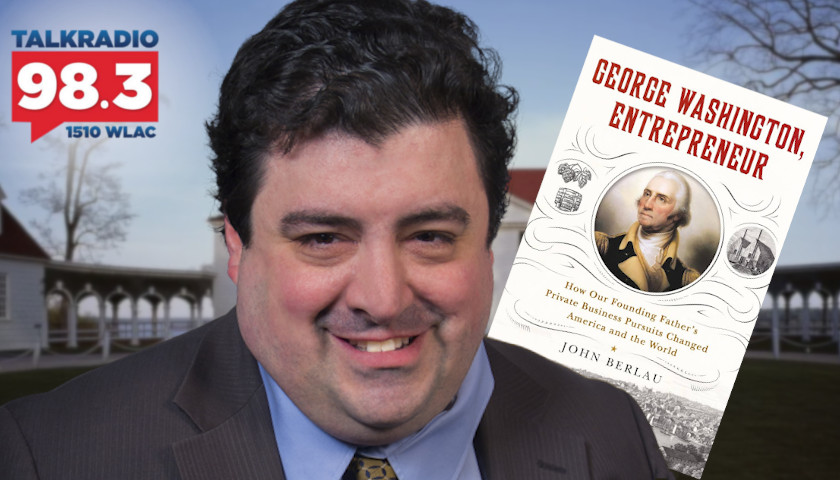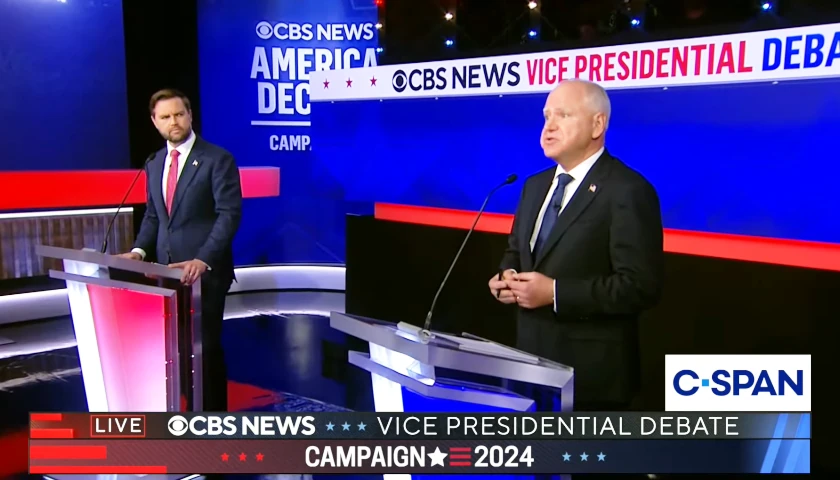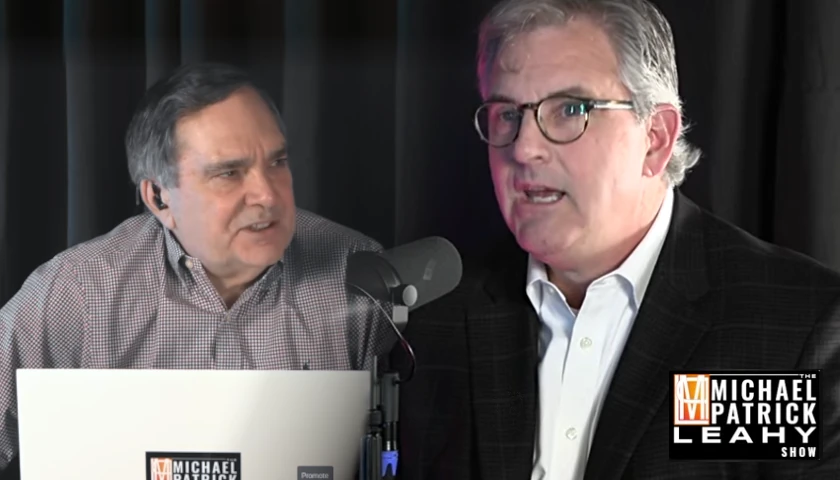Live from Music Row Wednesday morning on The Tennessee Star Report Early Edition with Michael Patrick Leahy – broadcast on Nashville’s Talk Radio 98.3 and 1510 WLAC weekdays from 5:00 a.m. to 8:00 a.m. – host Leahy welcomed American economist and the Director at the Center for Investors and Entrepreneurs at the Competitive Enterprise Institute John Berlau to the newsmakers line.
During the first hour, Berlau joined the show to discuss his new book entitled George Washington, Entrepreneur, and how his innovative spirit contributed to America. He also touched upon Washington’s relationship to slavery and how near the end of his life had led the way by freeing all of his slaves.
Leahy: We are joined now by my very good friend John Berlau, a senior fellow at the Competitive Enterprise Institute and the winner of several journalism prizes. Also the author of a great new book coming out towards the end of this month. George Washington, Entrepreneur: How Our Founding Fathers Private Business Pursuits Changed America and the World.
We had to bring John on just before the official release of his book though to comment on our lead story at The Tennessee Star. “Harpeth Hall Elite Nashville Prep School Drops George Washington.”
Not relevant to the way we teach history today. What do you think of that John?
Berlau: I think it’s very sad but unfortunately typical of what’s going on in the rest of the country. This is a private academy. They can do whatever they want. But if I were a parent wanting my daughter as a student at that school I would be very disappointed that they were not giving my daughter a well-rounded education.
And instead of becoming what they said they aren’t anymore and that they’re a protected enclave where they have to shelter students to any experience that might be different. Of course, George Washington is relevant if you live in this country being the father of this country and someone who set up the American system. A lot of by what he didn’t do which was assume power after the war and voluntarily give up power as president.
Leahy: Yes! I mean I would argue and you’ve written about him, he’s extraordinarily relevant for a number of reasons. And you’ve documented some relevant information about his tremendous character and impact and America in your book George Washington, Entrepreneur.
Berlau: Yes. Thanks, Mike. George Washington, Entrepreneur is available now for pre-order on book sites like Amazon and Barnes & Noble. on June 30. But there is something in the email that was sent from a parent to Harpeth Hall alumni where she said this is a case where innovation is conflicting with tradition. Well, what about America’s tradition of innovation.
It’s not a conflict. George Washington was responsible in many ways for setting up America’s tradition of innovation. He was an innovator himself. Making new plows and creating things like a 16-sided barn. Was the first to bring mules to America. And introducing crop rotation. Giving up tobacco when he said it was harmful and weed and hemp. And other crops.
But also that he was a patriot of American inventors both as a private citizen and a president. He championed as a private citizen and retired as a general before he was president. James Rumsey who was the co-inventor of the steamboat and who everybody thought was a crackpot. But Rumsey ended up making the design and Washington would eventually grant him and the other inventor of the patent that influenced the Fulton commercial steamboat 20 years later.
And Washington welcomed balloonists from France to this country and remarked in a letter that maybe we’ll travel someday by “travel through the air.” He had an innovative mind and came from a humble background and worked constantly and welcomed innovation to America.
Leahy: But the left-wingers who run Harpeth Hall, the elite private school where the tuition is more than $27,000 a year. And by the way, the alumni include Reese Witherspoon, the actress who just recently said we have to get rid of the Nathan Bedford Forrest bust in the state Capitol. George Washington they would say, “Well he must have been a morally bad person because he owned slaves.”
Tell us about his views of slavery and how that evolved throughout his life.
Berlau: Slavery is a stain on him and a stain on the country. But it’s a stain on the world including Africa where the African American scholar Henry Louis Gates, Jr. talked about how African kings and queens and others were willing partners in the Trans-Atlantic Slave Trade and had slaves themselves.
What was unique about America and other places in the western world was the abolition of slavery. I argue and others argue that Washington set us on a course through condemning slavery publicly as early as 1774 and the Fairfax Resolve. The list of grievances with Great Britain when America was still a colony an that he filed with George Mason who would become a fellow patriot.
But also he was the only president who helped slaves and freed all of his slaves at his death. In his will, he freed all the slaves. Over 100 that he owned. And he also set up provisions that Mt. Vernon was paying till 1830 for old-age pensions and for the younger one’s providing for their education.
He commendably saw the evils of the institution and took steps in his own, for what he could do to gradually end it. People said he could have done it sooner. He could have spoken out more. Nobody is the perfect man. There is no perfect man in history. What he did was honorable and set it on a course and Lincoln was inspired by him and of the other Founding Fathers.
Leahy: Doug Kellett. Doug, I don’t know if you’ve met John but a great guy. Competitive Enterprise Institute fellow. And a great book. I’ve been reading it. You sent it to me by the way. I love it. It’s a fabulous book. Doug meet John Berlau.
Kellett: Hi John.
Berlau: Hi Doug.
Kellett: You would think ok you see George Washington on the dollar bill. They are going to be curious about why he’s on the dollar bill and why he’s called the father of the country. If you aren’t going to really treat any appreciation of George Washington.
I think what’s always lost in this especially in the public schools specifically is that we don’t give appreciation and other Founding Fathers about how they put in place a government that provided the vehicle for change as attitudes changed over the centuries. We never really give any kind of appreciation to them.
Berlau: I think you’re right. It’s one thing to say, and it’s fine to teach criticism of the Founding Fathers. The letters said they’ve made changes to the program before. You could talk about slavery. You could talk about other things. You could say how he evolved and eventually freed all of his slaves and set the country on the course.
And how slavery is an evil but it isn’t a uniquely American evil. But yes, setting up. I talk about some of the reasons Washington who came from humble backgrounds himself. His family couldn’t afford college. His father died when he was 111. He was a middle child. He did not immediately inherit Mt. Vernon. He started out as a free land surveyor. He read constantly and improved himself.
There are a lot of things you could learn about women that Martha was a savvy businesswoman herself that became a widow with two children and ran her first husband’s business for a time. Then she would run significant things like the textile mill at Mt. Vernon.
There are so many things I think that are inspiring today about both George and Martha. And George, again, his tolerance in America of ethnic minorities when he went to the Jewish synagogues in 1790s in Rhode Island and said we give to bigotry no sanctions. There are so many inspiring things.
Plus nobody was perfect then and today the criticism you could say about how he slew the evils of Great Britain as far as frustrating American enterprise. My book George Washington, Entrepreneur talks about how there was a war against Americans starting manufacturing enterprises and how Great Britain wanted them to be in a mercantile system with total agriculture. And the evils we had in America here with slavery and other things.
Leahy: Here is what the head of school at the elite private prep school Harpeth Hall. It’s been around since 1951. It’s predecessors go back to the 19th century of this school. About the end of the George Washington celebration which has been around for around 70 years there.
They are ending the celebration but I can promise they’ve also changed the curriculum. They don’t say it specifically here. A couple of quotes. Just to get your reaction. Jess Hill said, “It is not consistent or relevant to the way that we teach history today that is celebrating George Washington. And it does not demonstrate the significant role women played in our history.”
Berlau: You can change it and you could talk about Martha’s role for women. But it’s certainly relevant.
Leahy: John Berlau author of George Washington, Entrepreneur.
Listen to the full first hour here:
– – –
Tune in weekdays from 5:00 – 8:00 a.m. to the Tennessee Star Report with Michael Patrick Leahy on Talk Radio 98.3 FM WLAC 1510. Listen online at iHeart Radio.
Photo “John Berlau” by the Competetitve Prize Institute. Photo “George Washington, Entrepreneur” by Amazon.





